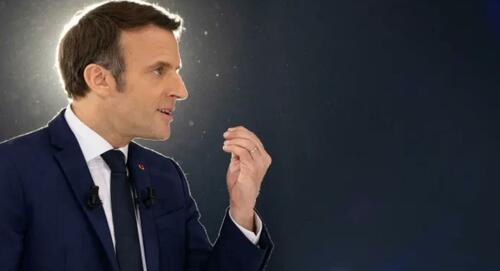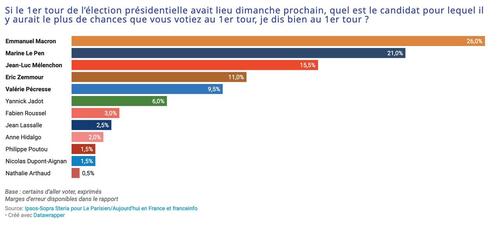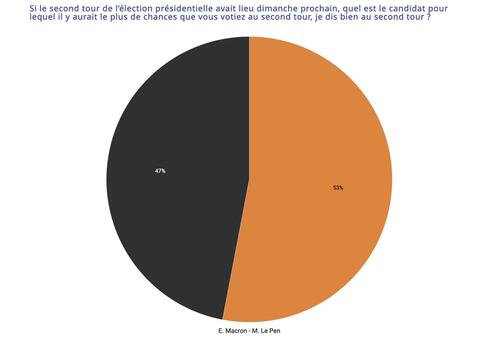“Don’t Believe The Pollsters” – Macron Tells Supporters He Could Still Lose French Election To The “Far Right”
Many untrained political observers probably assumed that the outbreak of war in Ukraine probably bolstered French President Emmanuel Macron’s odds of securing a second term during the French presidential election this month. But the truth is the race is much closer than it might appear.
With this in mind, Macron – who has survived multiple crises during his first five-year term, including the COVID pandemic and the Gilet-Jaunes protest movement that unleashed waves of unrest across Paris and other French population centers in retaliation for an increase in the fuel tax a few years back – warned his supporters on Saturday during a massive rally on the outskirts of Paris that he could very well lose to one of his “far right” rivals.
According to the FT, Macron warned his supporters on Saturday that one of his conservative rivals (perhaps National Rally leader Marine Le Pen) could very well defeat him. As evidence for this claim, he pointed to the Brexit vote, and his own victory in 2017.
“Don’t believe pollsters who say the election is already decided,” he said. “Look at us! Five years ago, it seemed impossible. Nothing is impossible.”
Macron spoke Saturday during his only major rally of the campaign held at the Paris La Defense Arena in Nanterre, a western suburb of Paris. During the rally, he told more than 10,000 supporters that the “extremist danger” facing France “is even greater” today “than it was a few months ago.”
“The extremist danger today is even greater than it was a few months ago, a few years ago,” he told supporters who gathered in an auditorium at La Défense just outside Paris on Saturday.”
“Don’t believe the commentators or the opinion polls who say it’s impossible, unthinkable, who say ‘the election is already won and it’ll all be fine’. Look at us, look at you, five years ago. People said it was impossible. Look at Brexit and so many elections where the result seemed improbable but did actually happen.”
Opinion polls project that Macron will prevail during the first round of voting next weekend, coming in ahead of Marine Le Pen, the conservative rival whom he bested during his initial presidential victory in 2017. Polls project that he will win during the second and final round, which will be held in three weeks. But compared to his original victory, polls are projecting a much narrowing margin of triumph.
The latest Ipsos survey released on Saturday, Macron would receive 26% of first round votes, followed by Le Pen on 21% and the far-left candidate Jean-Luc Mélenchon on 15.5%.
During the second round, Macron would beat Le Pen by 53% to 47%.
As the FT explains, Macron’s main vulnerability is linked to the fact that, after half a decade in power, he is seen as an entrenched part of the establishment. Despite having been appointed to serve in the government of former Socialist leader Francois Hollande following a career at the investment bank Rothschild & Co., Macron was viewed by the French people as an “outsider” who was “neither left nor right”, which allowed him to lead his “La Republique En Marche!” movement to victory.
This, of course, is no longer the case.
In 2017 Macron campaigned as a candidate who was “neither right nor left”. He had never held elected office and was hailed as a breath of fresh air. He crushed the two main political movements that had held the presidency for the past six decades: the Gaullists, now represented by the conservative Les Républicains, and the Socialists. This time, however, he is seen as part of the establishment after five years in the Elysée Palace.
And while he enjoyed a brief bump in his approval ratings following Russia’s invasion of Ukraine, the bump has since faded.
During his speech on Saturday, Macron boasted that France’s embrace of renewables and nuclear power (which France has courted in contrast to Germany, which rejected nuclear following the Fukushima Daiiche disaster in Japan), would allow France to become the first “great nation” to end its dependence on fossil fuels. Macron also emphasized his commitment to the EU, and bashed rivals Le Pen and (the left-wing pseudo-communist) Jean-Luc Melenchon for opposing the pan-European experiment.
According to Bloomberg, Macron also seized the opportunity to push back against critics who have slammed his government’s use of private consultants, including hiring American consulting giant McKinsey. His opponents have dubbed the controversy the “McKinsey Affair”
Tyler Durden
Sun, 04/03/2022 – 07:35
via ZeroHedge News https://ift.tt/MyzOFRI Tyler Durden


